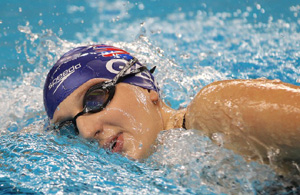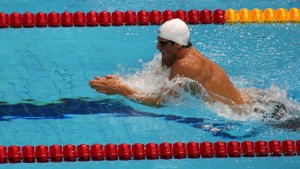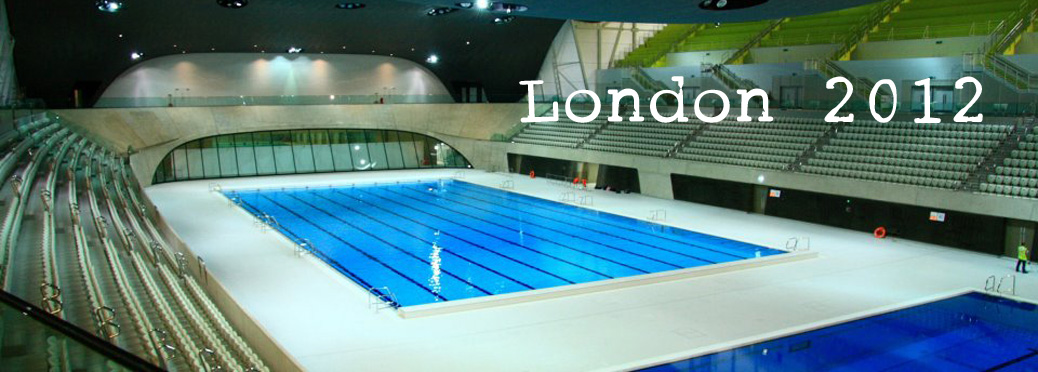
The swimming in the pool at London 2012 is over and the post meet inquest has begun, with all the inevitable explanations and post-rationalisation that entails. However, for British fans there is a sense of deja vu about the British performance which promised so much but fell short of expectations pushed sky high by encouraging performances over the last year.
For while many have complained about Britain’s swimmers being over hyped, the fact remains that at last year’s world championships Britain won 4 medals in Olympic events from 3 swimmers. So while the publicity machine may have been stretching the truth slightly to describe either James Goddard or Liam Tancock as anything more than outside medal contenders, it was not in the realms of fantasy to suggest that Rebecca Adlington, Hannah Miley or Ellen Gandy, or indeed Fran Halsall, fourth twice in Shanghai, could mount the podium in London.
In the event Adlington was the only one of those swimmers to fulfil the promise shown last year, in the process becoming Britain’s most successful Olympic swimmer of all time with her third and fourth Olympic medals. While she may be disappointed with her results, and tearfully apologised to the nation upon failing to retain her 800m freestyle title, in reality her results were nothing to be ashamed of in the slightest. Over 400m, bronze was always the most likely outcome; comparisons with her slower winning time in Beijing are unnecessary and irrelevant, but even if she had reproduced her season’s best set in the trials, it would not have improved her placing. Meanwhile in the 800m, it was always the risk, as Lotte Friis herself had noted, that someone would come from nowhere to take a medal. That the someone in this instance, America’s Katie Ledecky, was able to swim within a whisker of Adlington’s world record meant that gold was always going to be out of her reach. No questions should be asked about her time in that race, albeit that it was slower than her time from trials, being as it was hugely affected by the way the race panned out. The need to keep contact with the blistering early pace of Ledecky swam the finish out of Adlington whose desire to keep up with the lead early probably cost her silver. It certainly pushed Friis to the limit and the Dane fell off the podium she had been a strong favourite to reach.

The other success of the week for Britain was of course in the men’s breaststroke, where the only British personal bests of the entire competition were registered. The headlines all rightly go to Michael Jamieson for an incredibly mature performance that took him to silver in the 200m, but plaudits must also be given to Andrew Willis and Craig Benson who both set lifetime bests at the biggest meet of their careers to date. Jamieson’s swim showed the hallmarks of something that seemed to have eluded many of his teammates – the ability to perform under the pressure of a hugely vocal, partisan but supportive home crowd, and even to revel in it. Where others appeared to shrink he rose to the occasion magnificently and only the greatest swim ever seen in his event could deny him gold. However, that these three swimmers were the only ones out of a squad of 44 to produce best times is the most troubling aspect of the British performance.
For some of the older swimmers, those who swam though the poly-suited era, it is perhaps unfair to demand lifetime best times, but at the very least we might have expected season’s best performances in the competition that has been the focus of all of British swimming for several years. By that standard several more swimmers stepped up, but of our brightest medal hopes none was able to reproduce the form that got them to London in the first place.
Hannah Miley alluded to part of the issue after her 400IM final, a race in which her trials performance would have won bronze, when she talked about the need to swim hard in the heats just to reach the final. Miley posted 4:34.98 in her Olympic heat and reproduced a similar performance in the final for 5th place. Contrast that with a heats swim of 4:39.49 leading to a win at trials in 4:32.67 and you see how the issue of recovery and backing up in the final can impact on international results.
But at least Miley made it out of her heat, many didn’t. This is not a new problem; it’s one that has affected British swimmers on the global stage for over a decade – the seeming inability to treat the heats as the end, the time to produce a best performance. Because with a few notable exceptions Britain’s swimmers do not have the luxury of swimming below their best and then progressing to the evening sessions. Dealing with this is difficult – the relative lack of depth beyond the national team means our best swimmers simply don’t have to swim fast to make finals at domestic trials. Perhaps adopting a selection policy needing fast heats times may address this, but there is the danger then of sending small teams to international meets.
But there is a silver lining to be found, even if it rings somewhat hollow given the return of one silver and two bronze medals from just two swimmers, in that Britain achieved more finals placings than in Beijing, despite the lack of performance on the clock. This indicates a general rise in standard of the squad even if it failed to deliver the hardware expected. The trick now is to put that together with performance on the day.
And there is the key issue – performing on the day that it counts. No-one can fault the swimmers for their physical commitment. No-one can honestly stand up and say that any of the British team did not give their all and push themselves to the limit in the Olympic Aquatic Centre. Which means that focus must turn to preparation; were tapers missed? Was the squad over-trained, as has been admitted to be the case in the lead up to Athens in 2004? Has the mental side of performance been adequately addressed? All these and more are questions to be answered for the next Olympic cycle, starting with the World Championships in Barcelona next year. The hope for those who support our swimmers is that the lessons of a week in London, ones that resonate with those from previous championships, can finally be learnt.

